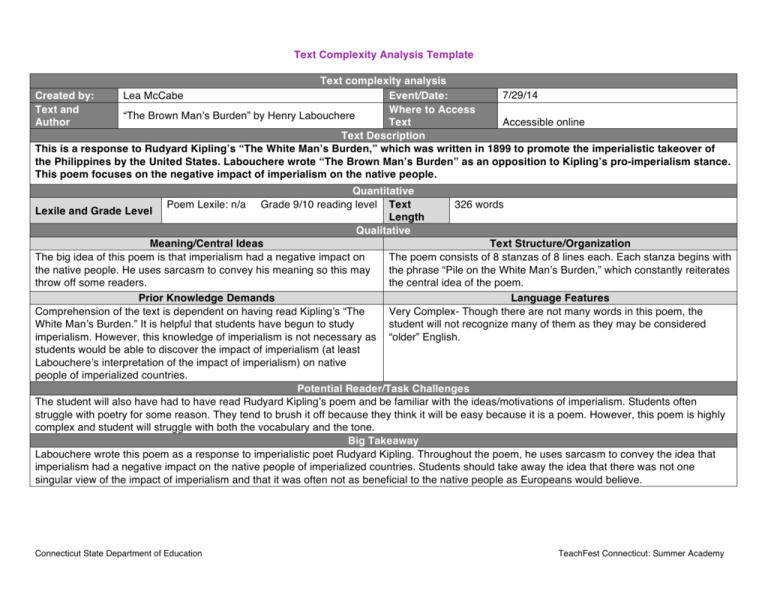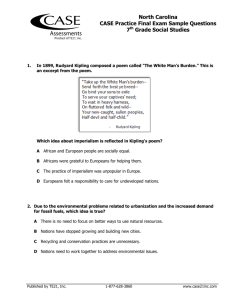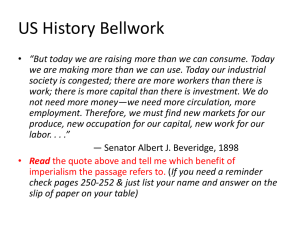The Brown Man's Burden - Henry Labouchere
advertisement

Text Complexity Analysis Template Text complexity analysis 7/29/14 Created by: Lea McCabe Event/Date: Text and Where to Access “The Brown Man’s Burden” by Henry Labouchere Author Text Accessible online Text Description This is a response to Rudyard Kipling’s “The White Man’s Burden,” which was written in 1899 to promote the imperialistic takeover of the Philippines by the United States. Labouchere wrote “The Brown Man’s Burden” as an opposition to Kipling’s pro-imperialism stance. This poem focuses on the negative impact of imperialism on the native people. Quantitative Grade 9/10 reading level Text 326 words Lexile and Grade Level Length Qualitative Meaning/Central Ideas Text Structure/Organization The big idea of this poem is that imperialism had a negative impact on The poem consists of 8 stanzas of 8 lines each. Each stanza begins with the native people. He uses sarcasm to convey his meaning so this may the phrase “Pile on the White Man’s Burden,” which constantly reiterates throw off some readers. the central idea of the poem. Prior Knowledge Demands Language Features Comprehension of the text is dependent on having read Kipling’s “The Very Complex- Though there are not many words in this poem, the White Man’s Burden.” It is helpful that students have begun to study student will not recognize many of them as they may be considered imperialism. However, this knowledge of imperialism is not necessary as “older” English. students would be able to discover the impact of imperialism (at least Labouchere’s interpretation of the impact of imperialism) on native people of imperialized countries. Potential Reader/Task Challenges The student will also have had to have read Rudyard Kipling’s poem and be familiar with the ideas/motivations of imperialism. Students often struggle with poetry for some reason. They tend to brush it off because they think it will be easy because it is a poem. However, this poem is highly complex and student will struggle with both the vocabulary and the tone. Big Takeaway Labouchere wrote this poem as a response to imperialistic poet Rudyard Kipling. Throughout the poem, he uses sarcasm to convey the idea that imperialism had a negative impact on the native people of imperialized countries. Students should take away the idea that there was not one singular view of the impact of imperialism and that it was often not as beneficial to the native people as Europeans would believe. Poem Lexile: n/a Connecticut State Department of Education TeachFest Connecticut: Summer Academy Vocabulary Analysis Template Words that cannot be determined in context Words that can be determined in context Words that demand less teaching time (i.e. the definition is singular and concrete) • • • • • • • Burden Shoot Dispute Hesitate Freedom Independence Sacred • • • equity squeamish lag Words that demand more teaching time (i.e. words with multiple meanings and/or that are part of a word family) • • • • • • • • Retort Ye Compel manifestos philanthropy proclaim imply remorse • • • • • • antiquated scruples rancor consumption falter Hie jingo Questions for Google Hangout: 1. I teach history and like to compare different points of view from different authors on the same subject. Should I do a close reading with ALL of those of is it more appropriate to choose one, especially if LearnZillion suggests 5 days with each close reading document. 2. How can I challenge my advanced students who “just get it” the first read through since there are supposed to be multiple reads of the same text? 3. How do I find time to teach content AND literacy? Does it really take 5 days for one document? Connecticut State Department of Education TeachFest Connecticut: Summer Academy








